Warning: This post contains graphic imagery and may not be safe for work.
Taking anti-selfies, peeing in public, dyeing your pubic hair in neon hues. These aesthetically electrifying forms of contemporary rebellion feel like they could only have spawned from the present moment, one marked by omnipresent smart phones and tyrannical beauty norms.
But Dutch artist Melanie Bonajo has been challenging gender identity and western notions of happiness with her striking breed of personal/political projects for the past 10 years. Her multidisciplinary works, exploring the female body and its relationship to sex, domesticity, oppression, and censorship, were certainly ahead of their time. And now that the world has caught up with her, it can't stop drooling.
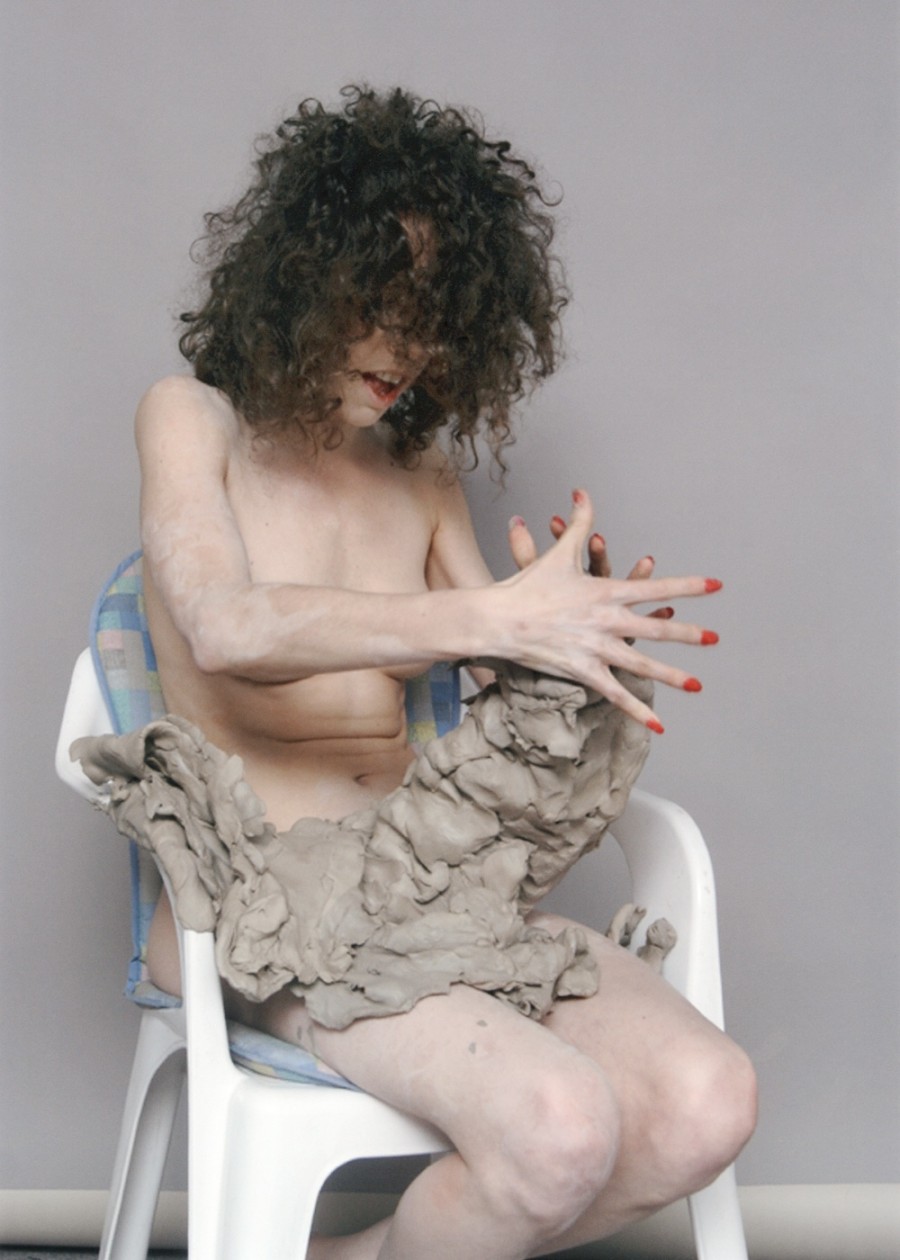
Bonajo takes photographs, plays in a band, choreographs performances and musical events. Her diverse range of projects overlap in their aim to present women from a distinctly female gaze. While most female imagery that saturates modern culture exists either to satisfy or tantalize men, or to sell products, Bonajo's artwork shows woman as woman, with no ulterior motive. The depicted women can be seen crying and peeing, nude and ugly -- you know, things women sometimes are -- adding to the sparse canon of realistic portrayals of female bodies.
We reached out to Bonajo to discuss her distaste for traditional selfies, the "gated community" of the art world and how peeing can be a little burst of freedom.
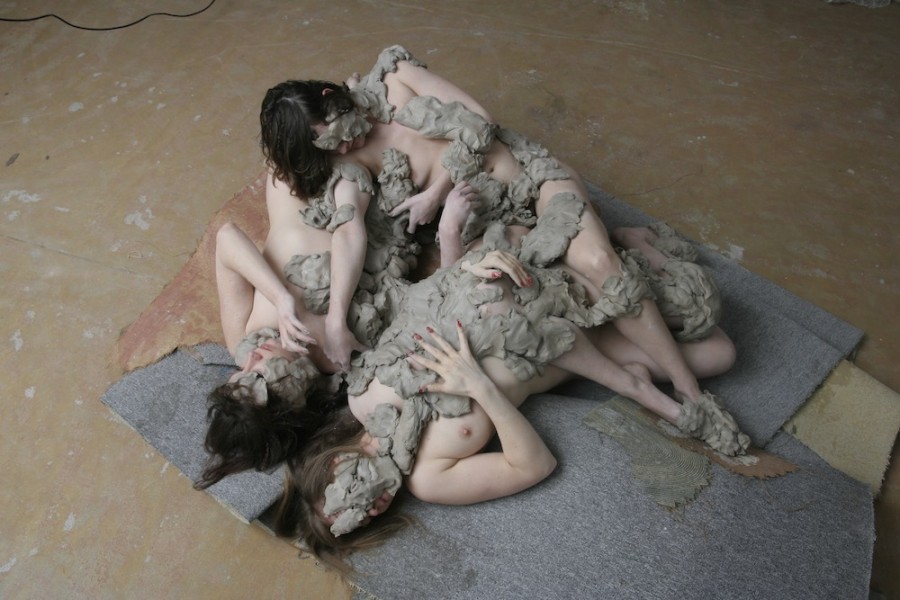
In the text for "Herstories of the Social Naked Body", you write that in the history of art, female figures are not seen as actual, living beings in the world with wishes of their own, but as fantasy figures, angels and witches. How did your series break free of this history?
I make sessions in which women were given a piece of clay which they could play around with and attach to their bodies, transforming themselves or each other in to a sculpture. The work doesn't show so much an end conclusion, but a process, an attempt to reshape and play around with your own form.
The females in the images underwent a process of taking control over their own historic image, morphing their bodies in to each other and so writing the history that will suit their purposes, instead of someone else writing it... It produces a work that is inherently contradictory, because that is the status quo of the modern women. The work plays with the contemporary dilemma of females wanting to fit in to society's mainstream ideas about beauty, but at the same time expressing an urge to be liberated from the dominant aesthetic of our time, which can be unpractical or highly demanding maintenance or even unhealthy. In a way I see the image having a will of its own.
Often there are opposing elements at work and these are visible in the image. It has a conceptual framework, a direction, but once the elements, the objects, the thoughts, and the people come together I need to kind of fuck up that idea in order to discover something outside the conventional narrative, to surpass my own predictability. For me it is important to disrupt my own plan, incorporate failure; things must go wrong and work with tension, to arrive at this wild unpredictable unknown the domain. Somewhere you can't reach with imagination.
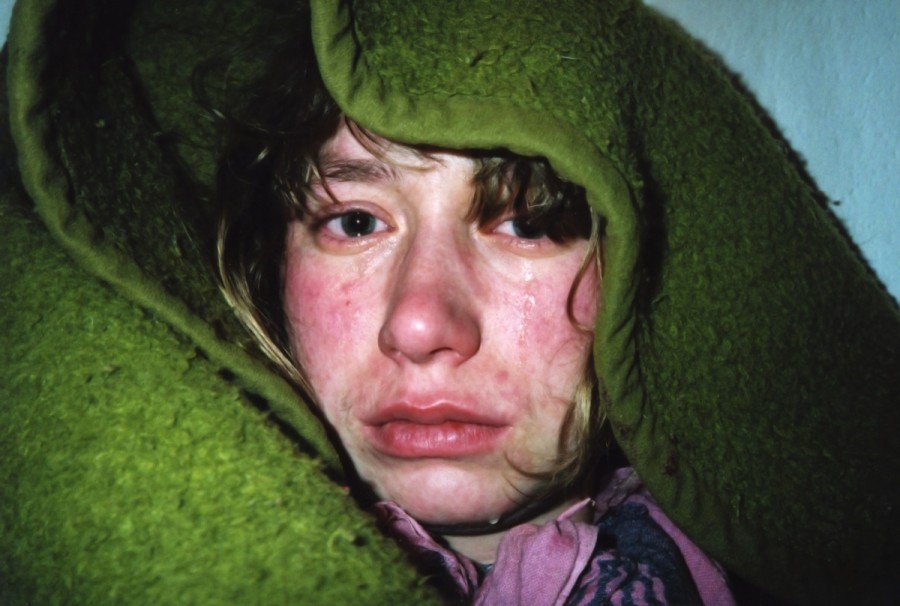
Obviously most of art history's representations of the female body were created by men. Selfies are an exception and yet often seem to reaffirm the male gaze even after removing the physical man. Do you think selfies have the capability to be radical or feminist? How do you view your "Anti-Selfie" series in relation?
Yes, of course they have the capability of being radical or feminist. Our generation knows the image of the self better then any other generation before, because of our access to cameras, media and sharing. And also, the language of the image is no longer in the hands of specialists. We are all experts in reading images and we know how to control and manipulate the viewer through images.
We have seen radical selfies before, like with women such as Amina, a nineteen year old Femen activist from Tunisia, who wrote "Fuck your morals" across her naked chest and took a selfie. She was threatened with death. Those women were not trying to be just pretty, but were burning down the foundations of their culture and screaming their injustice through cyberspace. Just like being forced to hide, just being pretty is a one sided simplification of the self. It probably evokes the right kind of attention, but it's not very interesting to me.
So to all those who read this: join, start discovering, start revolting. I started to take the pictures of myself crying as a way of putting myself outside of the situation of sadness and looking at myself from the point of view of an observer. As soon as you point the camera to yourself, you take yourself out of the moment and look at the situation from the perspective of an observer.
A dominant theme in our society is that you should be happy, attractive, sexy, young, and if you're not there's something wrong with you. The outrageousness of seeing all these images together made a kind of plot against the fake happiness, but at the same time also against the fake sadness our society is proposing to us. They represent a kindness and understanding towards weakness and disfunction, but at the same time they criticize themselves and turn the emotion into a kind of comedy. The best cure for sadness is humor, or maybe the other way is better, that sadness occurs by lack of humor. Even while being sad, a part of me was aware of the ridiculousness and selfishness of my melancholy.
I see how my period of illness has led me to understand and empathize with the large-scale problem of depression that modern Western society creates. Which is an individualistic, isolated, competitive, stressed out lifestyle based on monetary success and social status. A life spend mostly indoors, sleep deprived, supported by unhealthy food, awarding external markers of achievement with a lack of deeper meaning and no time for reflection. Our moral system is presenting us with an illusion of material happiness. Happiness ultimately doesn't flow from material obsessions.
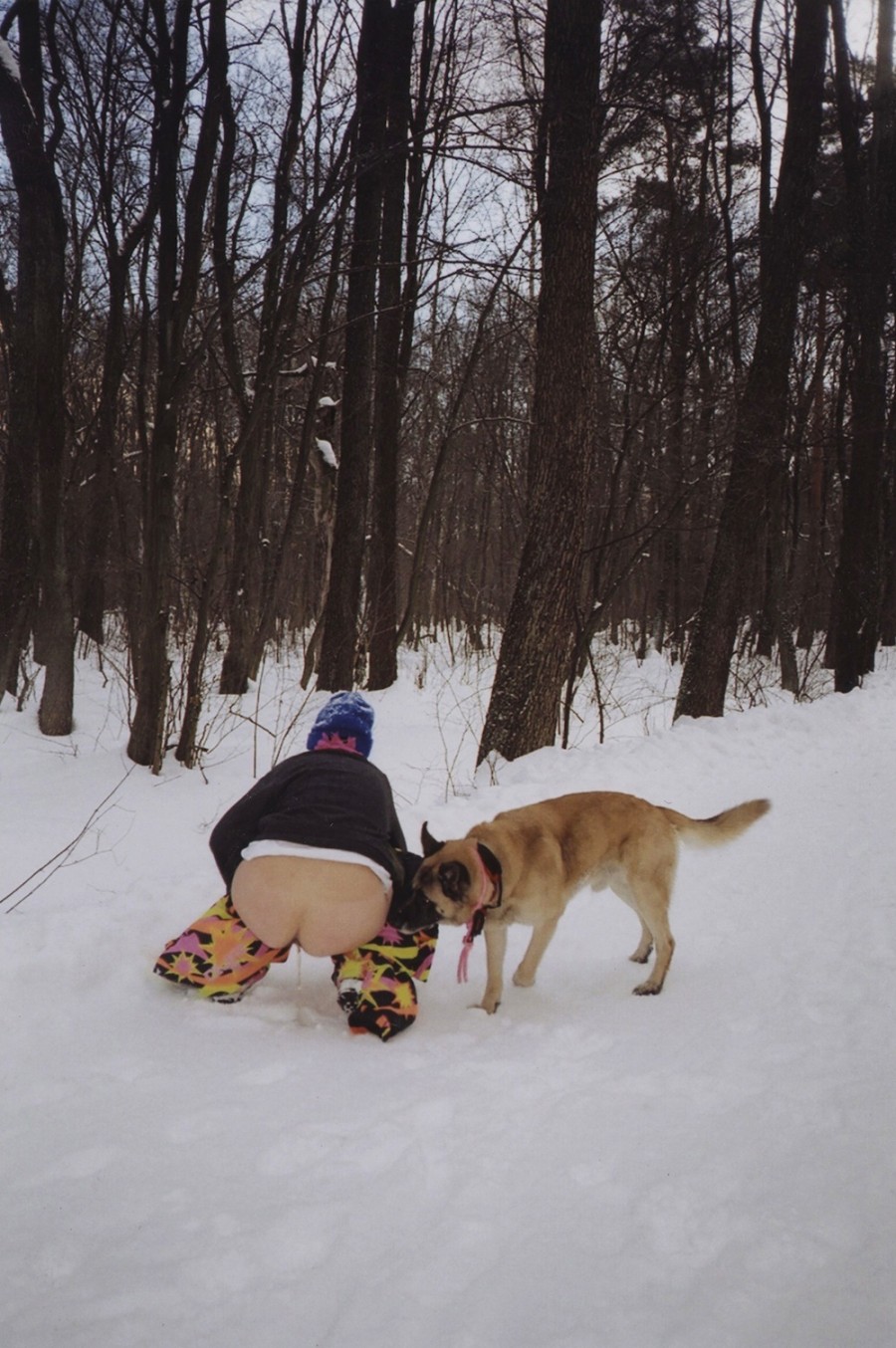
Life only happens to you once, you only have to do it right one time. One part of my work is to create these intense, long-term series of cultural phenomena that are kind of hidden or loaded with shame and a sense of social censorship. One of these was showing my own weakness by taking pictures of myself in sad moments crying, another one is taking hundreds of pictures of my girlfriends peeing in public spaces. The series often try to address the subject of female liberation and (body) representation, meaning they are not stylized images designed to appeal to the implied male spectator projected upon us by advertisement and mainstream media.
The series was taken in the period just before the digital boom, before everybody had a phone with a camera on it and platforms to display their private moments on. It was a kind of anti-selfie, one that is not a beautiful image made for self-promotion or using sexual attractiveness to make oneself visible as a woman waiting for applause. Taking yourself not too seriously is liberating the mind and spirit. Especially in these times of extreme narcissism, this can be a cure for society.
You mentioned your series "Pee on Presidents." What kind of reactions did you see to the video portion of the project before it was censored? What does its censorship say about the world we live in?
“Pee on Presidents” was my little YouTube hit that didn't last very long. It shows a collection of over two hundred photographs of peeing girls which I took over ten years, cross-fading over and into one another. The music I made with my band ZaZaZoZo (a collaboration with Joseph Marzolla). The pictures show empowering, yet vulnerable moments of females searching for a hideout while peeing in public space -- which is a not always easy thing to do. Small bushes, cars and secret corners of the city are used as hide-aways, while different squats, bends, twists and various complex balancing acts are performed. Often these are shared moments of intimacy with friends.
For me the photographs are like little fountains turned into sculptures, small gestures of reclaimed female freedom in urban spaces. Why did my video get censored? The problem is the absurd Western idea that female nudity is related to sexuality. This is a problem to me. The images on the video do not show the usual depiction of female body -- i.e. the beautiful, white, young lady shaving her armpits with soap that looks like it is giving her an orgasm. It's nude but its not made to seduce a male gaze or to sell a product. Because those images of women bore the shit out of me.
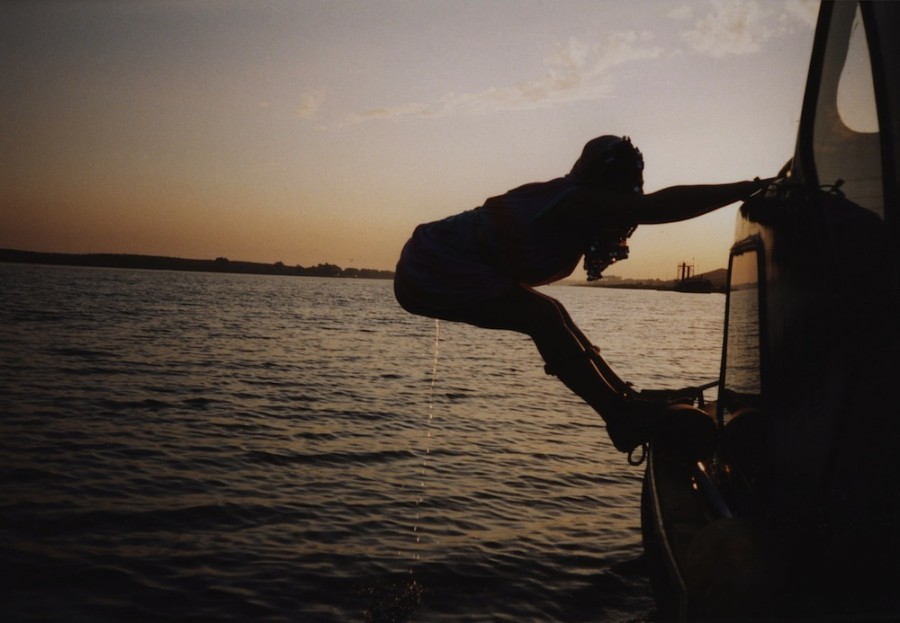
YouTube has specific, if in fact non-transparent, regulations regarding nudity on their site. Nudity is officially allowed for some educational, documentary, scientific and artistic content. In my opinion, my video covers all of those. This is social documentation, a part of everyday life. These images are not made to insult or provoke. I refuse to accept this censorship. I believe my video should be available to an online community and not solely banned to more liberal spaces, like museums, film festivals or porn sites.
I think it is important to keep negotiating with social media platforms. It seems too often aspects of the female body which, when not regulated according to the Western norms, are censored on social media platforms such as tumblr, Instagram, Facebook and YouTube. Censored topics include showing nipples, breast feeding, dancing and peeing. These are not pornographic, perverse images made to provoke. This is daily reality, and I need those images in order to feel normal as a woman. I want to be able to step outside society's fantasies or expectations of women and show my daily perception of being one without shame. Men are pissing in public all over YouTube. A censored online body is a reflection of censorship in our material reality.
The art world is a space where many women create to explore issues of gender freedom and fluidity, and yet so many feel like the art world is way more conservative than it claims to be. Perhaps even more reserved than the outside world. Do you see the art world as ahead of or behind the curve when it comes to feminist issues?
If I think about radical expression of cultural change or resistance, the "gated community" of the institutional art world is not the first platform which comes to mind. I see that a lot of younger people who make art with a rhetoric of critical interests in their work, use social media platforms to bring their ideas into the world and reach a broader audience outside of the critical community which has such a specific language. They want to be independent from institutions and the neoliberal economic attitude which is so entwined with art and its market system.
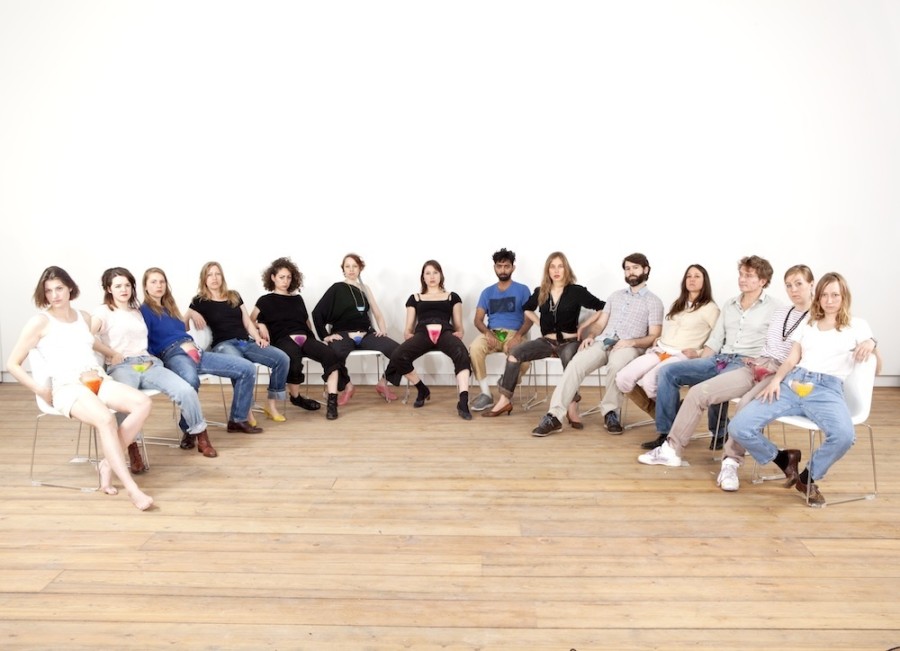
Art as something exclusive was never an idea that really caught on to me either. For me, personally, it has been a struggle to find my place inside the art system. I appreciate people who dare to take risks, like gallerists who dare to work with difficult artists or curators who take up the challenge to make long term projects with older artists instead of pumping out another group show. My practice is very diverse. I work with pop culture platforms, music venues, art institutions and self-organized alternatives. I believe its important to keep questioning the rules of any given genre or institution.
For a long time it was an absolute taboo to have an "I" in the work. Works were supposed to be made from an "objective," factual point of view. This can explained as a more masculine approach, because the more "feminine" works were supposed to be emotional and intuitive. This always seemed like a ridiculous idea to me and in lot of my work I tried to prove that by making extremely personal, emotional, spiritual works or works about Nature. For 10 years I was judged, critiqued and terribly misunderstood, until times changed again.
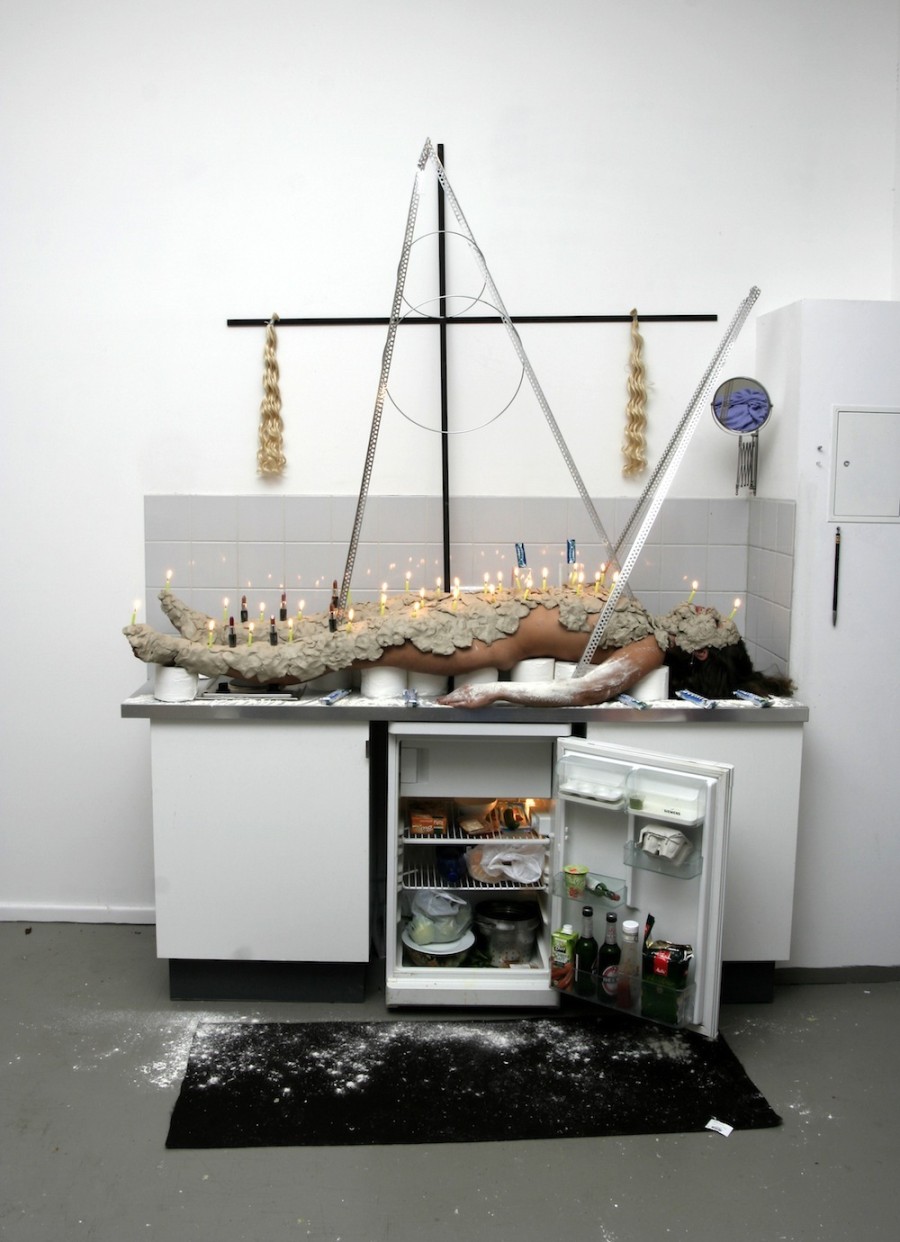
Also, many people forget that if you make personal work, your life turns itself into a work of fiction. You can not escape from becoming a character of yourself because you are always referring to some stereotypical human patterns which are universal, but caught in their own time. I have chosen to be patient and stick to my beliefs and now I see works that were made 10 years ago find their place. Every generation has its own answers or revised answers to the same "feminist" questions it seems.
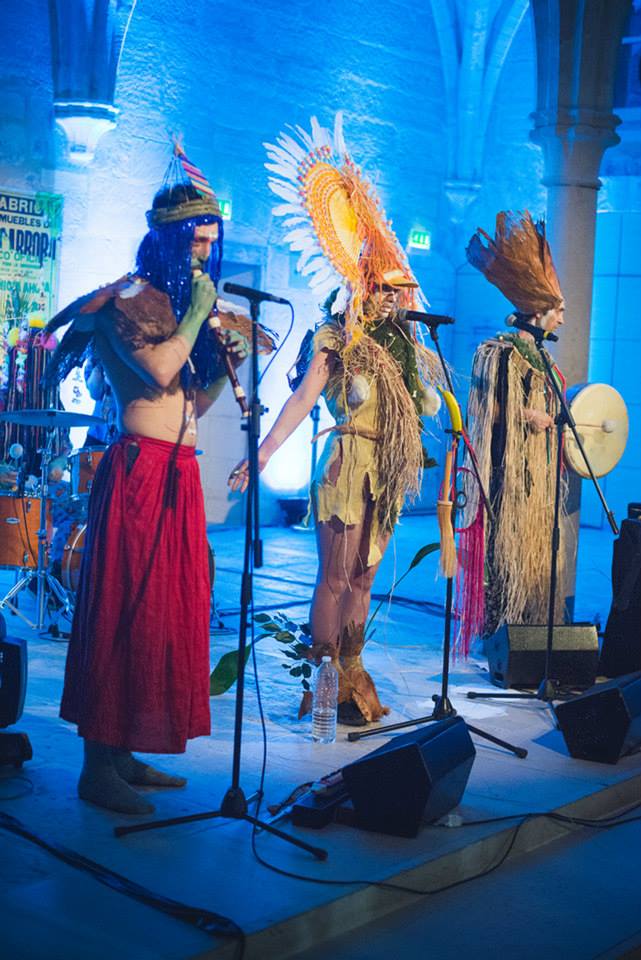
Does your band ZaZaZoZo address similar issues? How does the performance aspect complicate things?
Music has started to take a more prominent role in my work. It addresses similar issues, but with a different approach. It started very loosely a couple of years ago. I felt suffocated by the art world and was looking for a new method to challenge myself. I needed a more non-mental process, a shared way of creating, based on flow and playing together without a goal. Something that is more about the moment and sharing that moment with your audience. It felt refreshing to shift platforms. It's refreshing to work with another audience.
But eventually in my practice all of the things I do start to run in to each other and it's impossible to keep things separate. So out of the music, which is a collaboration with Joseph Marzolla, large performances developed. They all are very collaborative. We work a lot with outsider artists, amateurs and interact a lot with the audience too. We recorded, our album Inua, which came out last year, in Greenland. I am interested in these places that are not completely overtaken by Western capitalism and globalization. They are on the verve of two cultures morphing and temporarily form this often awkward hybrid. These places are rare to find nowadays on our planet.
The landscape of the Arctic made us feel very humbled and inspired the musical language of the album. The themes flew out of the stories the landscape was telling us. We are now working on a new album which we recorded in New York. Our new video "Woke up as Wolf" deals with contemporary topics much closer to home. It redefines sexuality in the digital age from a female perspective by reversing a stereotypical male attitude. The video is in a way a satire, reversing roles in a humorous way by commenting on scoring, but also giving a soft loving charm to the encounters. It depicts a young women living a solitary, free, single existence in the big city. We try to show that Modern sexual relations can be polyamorous relationships where friends are lovers or huggers. An open, loving attitude towards sexuality exists which is friendly, playful, safe, caring, loving, empowering and fun for everyone.
There is still a lot of judgement in relation to being female and free and open in being sexual and active. When a man has many lovers it is a status thing, but if a women shares her love between many partners it most often is judged or misinterpreted as something being wrong with you. Physical intimacy is a beautiful aspect of being human and sharing this with others is beneficial for our mental, spiritual and physical health. With "Woke up as a Wolf" we want to bring light to sexuality as a way of sharing energy which can be healing, in depth, nurturing, sexy for everyone and a remedy for our solitary modern lives.
See more of Bonajo's work below:

















End Note from Melanie Bonajo: At the end of this month a lot events and publications are being launched in relation to this theme [of women in art] in New York. I am organizing a music performance event called "Night Soil" together with musician Bunny Michael which will be a celebration of the psychedelic and sexual powers of people. It will take place on September 28 in the Baby is Alright, where we will unite forces with the Future Feminist collective (comprised of Antony, Kembra Pfahler, Johanna Constantine, Bianca and Sierra Casady of CocoRosie) who has an upcoming show at the Hole.
Correction: An earlier edition of this article stated Bojano was Danish. We regret the error.
